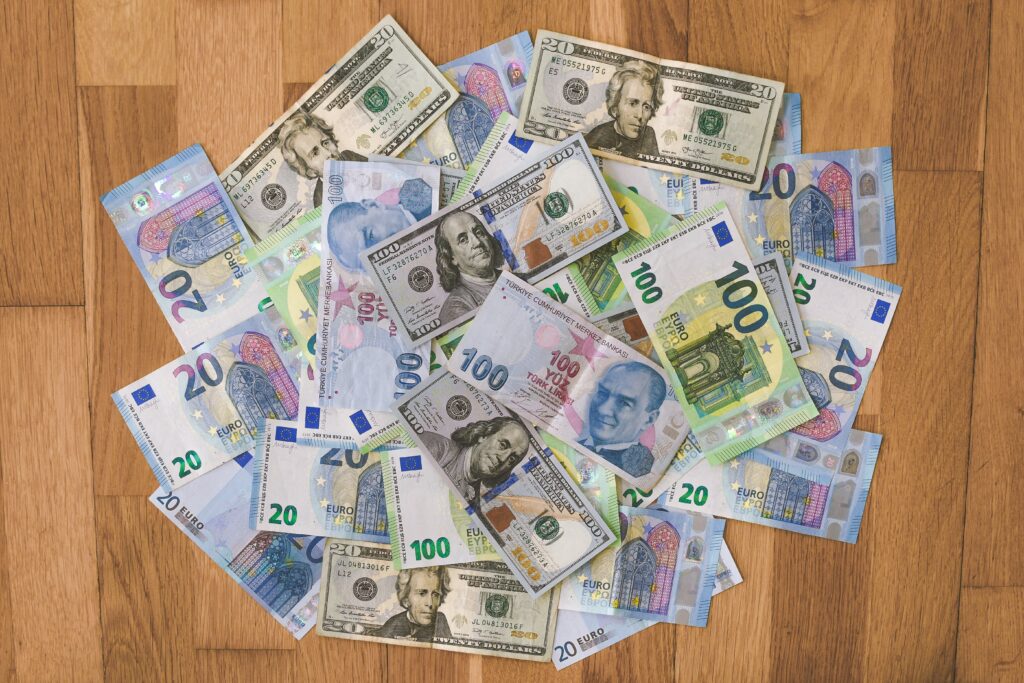Photo by Ibrahim Boran on Unsplash
Qual é o melhor país para se viver? É aquele com a melhor comida? A maior expectativa de vida? O melhor clima? Nos últimos 70 anos, a maioria dos governos se baseou fortemente em um único número: o Produto Interno Bruto, ou PIB. Mas este indicador nunca foi planejado para seu propósito atual; e alguns argumentam que somos viciados em fazê-lo crescer. Explore as diferentes maneiras pelas quais os países medem a qualidade de vida. (Fonte: Youtube.com)
| Audio | |
|---|---|
Normal | Slow |
| English Transcript | Tradução |
| What's the best country in the world to live in? | Qual é o melhor país do mundo para se viver? |
| Is it the one with the best food? | É aquele com a melhor comida? |
| The longest life expectancy? | A maior expectativa de vida? |
| The best weather? | O melhor clima? |
| For the past 70 years, most governments have relied heavily on a single number to answer that question. | Nos últimos 70 anos, a maioria dos governos confiou fortemente em um único número para responder a essa pergunta. |
| This number influences elections, the stock market, and government policy. | Esse número influencia as eleições, o mercado de ações e a política do governo. |
| But it was never intended for its current purpose; and some would argue that the world is addicted to making it grow... forever. | Mas nunca foi planejado para seu propósito atual; e alguns argumentariam que o mundo está viciado em fazê-lo crescer... para sempre. |
| This number is called the Gross Domestic Product, or GDP, and it was invented by the economist Simon Kuznets in the 1930s, to try and gauge the size of an economy in a single, easy to understand number. | Esse número é chamado de Produto Interno Bruto, ou PIB, e foi inventado pelo economista Simon Kuznets na década de 1930, para tentar medir o tamanho de uma economia em um único número fácil de entender. |
| GDP is the total monetary value of everything a country produces and sells on the market. | O PIB é o valor monetário total de tudo o que um país produz e vende no mercado. |
| To this day, GDP per capita, which is just the total GDP divided by the number of people living in that country, is widely seen as a measure of well-being. | Até hoje, o PIB per capita, que é apenas o PIB total dividido pelo número de pessoas que vivem naquele país, é amplamente visto como uma medida de bem-estar. |
| But GDP doesn't actually say anything direct about well-being, because it doesn't take into account what a country produces or who has access to it. | Mas o PIB não diz nada diretamente sobre o bem-estar, porque não leva em conta o que um país produz ou quem tem acesso a ele. |
| A million dollars of weapons contributes the exact same amount to a country's GDP as a million dollars of vaccines or food. | Um milhão de dólares em armas contribui exatamente com a mesma quantia para o PIB de um país que um milhão de dólares em vacinas ou alimentos. |
| The value society derives from things like public school or firefighters isn't counted in GDP at all, because those services aren't sold on the market. | O valor que a sociedade deriva de coisas como escola pública ou bombeiros não é contabilizado no PIB, porque esses serviços não são vendidos no mercado. |
| And if a country has a lot of wealth, but most of it is controlled by relatively few people, GDP per capita gives a distorted picture of how much money a typical person has. | E se um país tem muita riqueza, mas a maior parte dela é controlada por relativamente poucas pessoas, o PIB per capita dá uma imagem distorcida de quanto dinheiro uma pessoa típica tem. |
| Despite all that, for a long time, higher GDP did correlate closely to a higher quality of life for people in many countries. | Apesar de tudo isso, por muito tempo, o PIB mais alto correlacionou-se intimamente com uma maior qualidade de vida para as pessoas em muitos países. |
| From 1945 to 1970, as GDP doubled, tripled or even quadrupled in some western economies, people's wages often grew proportionally. | De 1945 a 1970, quando o PIB dobrou, triplicou ou até quadruplicou em algumas economias ocidentais, os salários das pessoas muitas vezes cresceram proporcionalmente. |
| By the 1980s, this changed. | Na década de 1980, isso mudou. |
| Countries continued to grow richer, but wages stopped keeping pace with GDP growth, or in some cases, even declined, and most of the benefits went to an ever-smaller percentage of the population. | Os países continuaram a ficar mais ricos, mas os salários pararam de acompanhar o crescimento do PIB ou, em alguns casos, até caíram, e a maioria dos benefícios foi para uma porcentagem cada vez menor da população. |
| Still, the idea of capturing a nation's well-being in a single number had powerful appeal. | Ainda assim, a ideia de capturar o bem-estar de uma nação em um único número tinha um forte apelo. |
| In 1972, King Jigme Singye Wangchuk of Bhutan came up with the idea of Gross National Happiness as an alternative to Gross Domestic Product. | Em 1972, o rei Jigme Singye Wangchuk, do Butão, teve a ideia de Felicidade Nacional Bruta como uma alternativa ao Produto Interno Bruto. |
| Gross National Happiness is a metric that factors in matters like health, education, strong communities, and living standards, having citizens answer questions like, "How happy do you think your family members are at the moment?", "What is your knowledge of names of plants and wild animals in your area?", and "What type of day was yesterday?" | A Felicidade Nacional Bruta é uma métrica que leva em consideração questões como saúde, educação, comunidades fortes e padrões de vida, fazendo com que os cidadãos respondam a perguntas como: "Você acha que seus familiares estão felizes no momento?", "Qual é o seu conhecimento sobre nomes de plantas e animais selvagens em sua área?", e "Que tipo de dia foi ontem?" |
| The United Nations' Human Development Index is a more widely used metric; it takes into account health and education, as well as income per capita to estimate overall well-being. | O Índice de Desenvolvimento Humano das Nações Unidas é uma métrica mais amplamente utilizada; leva em consideração a saúde e a educação, bem como a renda per capita para estimar o bem-estar geral. |
| Meanwhile, a metric called the Sustainable Development Index factors in both well-being and the environmental burdens of economic growth, again, boiling all this down to a single number. | Enquanto isso, uma métrica chamada Índice de Desenvolvimento Sustentável leva em consideração tanto o bem-estar quanto os encargos ambientais do crescimento econômico, novamente, resumindo tudo isso em um único número. |
| Though no country has been able to meet the basic needs of its people while also using resources fully sustainably, Costa Rica currently comes the closest. | Embora nenhum país tenha sido capaz de atender às necessidades básicas de seu povo e ao mesmo tempo usar os recursos de forma totalmente sustentável, a Costa Rica atualmente chega mais perto. |
| Over the past few decades, it's managed to grow its economy and improve living standards substantially without drastically increasing its emissions. | Nas últimas décadas, conseguiu aumentar sua economia e melhorar substancialmente os padrões de vida sem aumentar drasticamente suas emissões. |
| Other countries, like Colombia and Jordan, have made notable progress. | Outros países, como Colômbia e Jordânia, fizeram progressos notáveis. |
| Costa Rica now has better well-being outcomes like life expectancy than some of the world's richest countries. | A Costa Rica agora tem melhores resultados de bem-estar, como expectativa de vida, do que alguns dos países mais ricos do mundo. |
| Ultimately, there are limits to any approach that boils the quality of life in a country down to a single number. | Em última análise, há limites para qualquer abordagem que reduza a qualidade de vida de um país a um único número. |
| Increasingly, experts favor a dashboard approach that lays out all the factors a single number obscures. | Cada vez mais, os especialistas favorecem uma abordagem de painel que apresenta todos os fatores que um único número obscurece. |
| This approach makes even more sense given that people have different priorities, and the answer to which country is best to live in depends on who's asking the question. | Essa abordagem faz ainda mais sentido, já que as pessoas têm prioridades diferentes, e a resposta para qual país é melhor para se viver depende de quem está fazendo a pergunta. |
| So what if that were you designing your country's well-being metric? | E se você estivesse projetando a métrica de bem-estar de seu país? |
| What do you value, and what would you measure? | O que você valoriza e o que você mediria? |
Contagem de palavras
A tabela abaixo exibe as palavras encontradas neste vídeo, bem como o número de vezes em que aparecem.
Veja também: Para que serve esta tabela?
| Freq. | Palavra | Freq. | Palavra | Freq. | Palavra |
|---|---|---|---|---|---|
| 37 | the | 24 | a | 22 | of |
| 21 | to | 16 | in | 16 | and |
| 15 | is | 11 | gdp | 9 | that |
| 9 | number | 9 | it | 8 | well |
| 8 | country | 7 | what | 7 | being |
| 6 | this | 6 | single | 6 | or |
| 6 | as | 5 | people | 5 | like |
| 5 | has | 4 | your | 4 | you |
| 4 | some | 4 | on | 4 | not |
| 4 | metric | 4 | life | 4 | its |
| 4 | gross | 4 | for | 4 | countries |
| 4 | by | 4 | but | 4 | best |
| 4 | all | 3 | with | 3 | was |
| 3 | value | 3 | per | 3 | most |
| 3 | market | 3 | living | 3 | have |
| 3 | grow | 3 | factors | 3 | even |
| 3 | capita | 3 | are | 3 | approach |
| 3 | answer | 3 | an | 2 | would |
| 2 | world | 2 | widely | 2 | who |
| 2 | which | 2 | wages | 2 | total |
| 2 | standards | 2 | s | 2 | rica |
| 2 | question | 2 | quality | 2 | product |
| 2 | produces | 2 | past | 2 | national |
| 2 | more | 2 | million | 2 | measure |
| 2 | live | 2 | into | 2 | index |
| 2 | if | 2 | idea | 2 | how |
| 2 | higher | 2 | health | 2 | happiness |
| 2 | growth | 2 | from | 2 | food |
| 2 | few | 2 | expectancy | 2 | education |
| 2 | economy | 2 | down | 2 | domestic |
| 2 | dollars | 2 | does | 2 | do |
| 2 | development | 2 | day | 2 | country's |
| 2 | costa | 2 | called | 2 | because |
| 2 | at | 2 | account | 1 | yesterday |
| 1 | years | 1 | world's | 1 | without |
| 1 | wild | 1 | while | 1 | western |
| 1 | were | 1 | went | 1 | weather |
| 1 | weapons | 1 | wealth | 1 | wangchuk |
| 1 | vaccines | 1 | using | 1 | used |
| 1 | up | 1 | united | 1 | understand |
| 1 | ultimately | 1 | typical | 1 | type |
| 1 | try | 1 | tripled | 1 | time |
| 1 | though | 1 | those | 1 | think |
| 1 | things | 1 | there | 1 | than |
| 1 | takes | 1 | take | 1 | sustainably |
| 1 | sustainable | 1 | substantially | 1 | strong |
| 1 | stopped | 1 | stock | 1 | still |
| 1 | sold | 1 | society | 1 | so |
| 1 | smaller | 1 | size | 1 | singye |
| 1 | simon | 1 | services | 1 | sense |
| 1 | sells | 1 | seen | 1 | school |
| 1 | say | 1 | same | 1 | richest |
| 1 | richer | 1 | resources | 1 | relied |
| 1 | relatively | 1 | questions | 1 | quadrupled |
| 1 | purpose | 1 | public | 1 | proportionally |
| 1 | progress | 1 | priorities | 1 | powerful |
| 1 | population | 1 | policy | 1 | plants |
| 1 | picture | 1 | person | 1 | percentage |
| 1 | people's | 1 | pace | 1 | overall |
| 1 | over | 1 | outcomes | 1 | out |
| 1 | other | 1 | one | 1 | often |
| 1 | obscures | 1 | now | 1 | notable |
| 1 | no | 1 | never | 1 | needs |
| 1 | nations' | 1 | nation's | 1 | names |
| 1 | much | 1 | money | 1 | monetary |
| 1 | moment | 1 | members | 1 | meet |
| 1 | meanwhile | 1 | matters | 1 | many |
| 1 | managed | 1 | making | 1 | makes |
| 1 | made | 1 | lot | 1 | longest |
| 1 | long | 1 | limits | 1 | lays |
| 1 | kuznets | 1 | knowledge | 1 | king |
| 1 | keeping | 1 | just | 1 | jordan |
| 1 | jigme | 1 | invented | 1 | intended |
| 1 | influences | 1 | increasingly | 1 | increasing |
| 1 | income | 1 | improve | 1 | human |
| 1 | heavily | 1 | having | 1 | happy |
| 1 | had | 1 | grew | 1 | governments |
| 1 | government | 1 | gives | 1 | given |
| 1 | gauge | 1 | fully | 1 | forever |
| 1 | firefighters | 1 | favor | 1 | family |
| 1 | experts | 1 | exact | 1 | everything |
| 1 | ever | 1 | estimate | 1 | environmental |
| 1 | emissions | 1 | elections | 1 | economist |
| 1 | economies | 1 | economic | 1 | easy |
| 1 | drastically | 1 | doubled | 1 | divided |
| 1 | distorted | 1 | direct | 1 | different |
| 1 | did | 1 | despite | 1 | designing |
| 1 | derives | 1 | depends | 1 | declined |
| 1 | decades | 1 | dashboard | 1 | currently |
| 1 | current | 1 | counted | 1 | correlate |
| 1 | controlled | 1 | contributes | 1 | continued |
| 1 | communities | 1 | comes | 1 | colombia |
| 1 | closest | 1 | closely | 1 | citizens |
| 1 | changed | 1 | cases | 1 | capturing |
| 1 | came | 1 | burdens | 1 | both |
| 1 | boils | 1 | boiling | 1 | bhutan |
| 1 | better | 1 | benefits | 1 | been |
| 1 | basic | 1 | asking | 1 | argue |
| 1 | area | 1 | appeal | 1 | anything |
| 1 | any | 1 | animals | 1 | amount |
| 1 | alternative | 1 | also | 1 | again |
| 1 | addicted | 1 | actually | 1 | access |
| 1 | about | 1 | able |











Excelente!